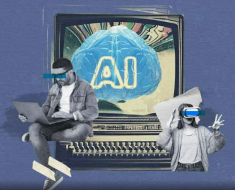Artificial intelligence (AI) is advancing rapidly in the world of technology and has already become a part of our daily lives. However, the AI applications we have encountered so far are generally systems that succeed in narrow and specific tasks. For example, an AI model might be better than humans at diagnosing diseases, but that same model cannot write a creative story or think abstractly. This is where Artificial General Intelligence (AGI) comes into play. AGI, as a form of AI that operates closest to human intelligence, has the potential to fundamentally change our lives.
What is AGI and What Does it Promise?
Today’s AI systems can be very good at a single task, whereas AGI will possess a general level of intelligence, similar to a human. This means that AGI will be able to perform different tasks, learn new things, and apply what it has learned in different areas. In other words, AGI could diagnose diseases while simultaneously composing music or solving complex scientific problems. This versatility is the most important feature that distinguishes AGI from current AI systems.
AGI’s ability to carry out every cognitive task that a human can do could create revolutions not only in the tech world but also in healthcare, education, science, and business. By accelerating the solution of complex problems, particularly in scientific research, AGI could tackle difficult diseases such as cancer or develop solutions for global issues like climate change.
Why is Current AI Insufficient?
The AI systems we use today are narrow AI systems designed to be good at specific tasks. For example, an AI model may excel at image recognition, but that same model lacks language comprehension or problem-solving abilities. This is one of the biggest limitations of today’s AI systems. AGI, on the other hand, is structured to think like a human and produce creative solutions when faced with a problem.
What catches my attention the most is AGI’s ability to apply what it learns in one context to different areas. This is one of the most important aspects of human intelligence, and it is the point that AGI aims to reach. In other words, AGI will be able to exhibit versatile and flexible intelligence by using knowledge acquired in one field across various others.
AGI’s Place in Our Lives
I believe that once AGI is developed, this technology will fundamentally change our lives. We will see major innovations in many areas, especially in the development of personalized treatment methods in healthcare, offering individual learning paths to students in education, and increasing efficiency in the business world. It’s exciting to think that AGI will help scientists and engineers find faster and more effective solutions to problems that are difficult to solve.
However, it would be misleading to think that AGI will only create positive effects. The uncontrolled development of this technology and its misuse for malicious purposes could also bring serious security risks. Therefore, ethical and safety standards need to be prioritized during AGI’s development. While AGI offers great opportunities, it is also a powerful force that must be managed with care.
Artificial General Intelligence (AGI), as an AI that mimics human intelligence and possesses the ability to think flexibly across many domains, could be the next major step in the world of technology. However, careful steps need to be taken along this path. The development of AGI is not only a technical achievement but also brings significant responsibilities in terms of ethics and safety. If we can properly evaluate the opportunities that this technology offers, we can achieve great gains as humanity.





